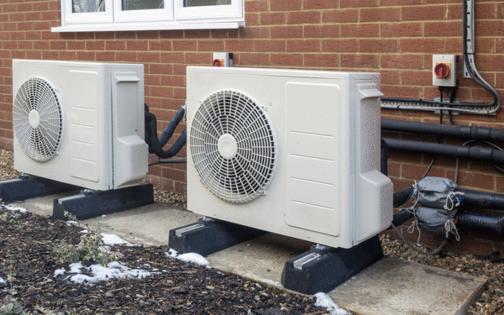Confused about expiring energy credits under the Trump administration? Ask an 'electricity coach'
Published in Business News
As part of its ongoing effort to boost fossil fuels such as oil and natural gas, the Trump administration is slashing nearly a dozen rebates and tax credits for electric vehicles, heat pumps, home weatherization, electric panel upgrades, battery storage, geothermal heating, EV chargers and more — many before the end of this year.
The rapidly changing landscape is leaving many consumers confused about their options and the deadlines. Enter electricity coaches.
The Washington, D.C.-based nonprofit Rewiring America is offering free sessions with trained coaches who can help people navigate federal energy incentives before they expire.
“There are a slew of incentives that are available to households ... but the clock is ticking and families need to act now to claim those incentives before they disappear,” said Ari Matusiak, Rewiring America’s chief executive. “There are incentives for upgrades in people’s homes that can save them money on their energy bills — which is a top-of-mind concern for many people — but also create healthier and more comfortable homes along the way.”
The Trump administration has described the credits and incentives as ideologically motivated boondoggles that limit consumer choice and drive up costs.
But the “kitchen table decisions” that people make about what kind of car to drive, how to cook their meals, how to heat and cool their homes, and how to dry their clothes represent about a billion appliances and machines across the United States. These are responsible for 42% of energy-related emissions, Matusiak said.
In 2023, the most recent year for which data were available, 3.4 million households took advantage of $8 billion in energy tax credits, according to the U.S. Treasury Department.
Some 1,600 people signed up to become volunteer energy coaches this year. They undergo a rigorous four-week training session, according to Lisa Ryers, a San Francisco-based coach with the program.
Ryers, who has a background in architecture, said she wanted to use her experience navigating building codes on large commercial projects to help people at the residential level.
“Whenever I’m talking about rebates and incentives, one word that’s understandable by everyone is ‘sale,’” she said. “It’s really important to take advantage of this sale that’s going to be expiring.”
While every home and homeowner is different, she said, heat pumps have become increasingly popular as more people become aware of them. The electric pumps often replace both a heater and an air conditioner, because they can heat and cool, often much more efficiently than traditional ACs and furnaces.
The $2,000 federal credit for heat pumps, as well as for hot water heaters that have a built-in heat pump expires Dec. 31. Heat pump home heaters can range from $3,000 to upward of $20,000, so a $2,000 credit can be “really important” for some families, Ryers said. She underscored that people actually have to get the units installed, not just purchase them by the Trump administration’s deadlines.
The deadlines come as the Trump administration tries to throttle the clean energy transition while supporting oil, gas and coal. The president in recent months has signed a flurry of executive orders toward these ends, including his “unleashing American energy” directive which calls for an end to electric vehicle sales targets created under the Biden administration and an expansion of fossil fuel production in the United States.
Trump’s budget reconciliation package — the so-called Big Beautiful Bill, passed in July — took this even further by sunsetting the tax credits aimed at helping consumers electrify their homes and cars, including $7,500 and $4,000 tax credits for new and used electric vehicles, which expire on Sept. 30.
While many of the credits stemmed from Biden’s Inflation Reduction Act, some date back as far as the Bush administration in 2005.
But remaining state incentives can still be significant, including California’s Energy Smart Homes Program that offers homeowners up to $4,250 for electric and energy-efficient appliances. Rewiring America’s coaches are also conversant in these state and local incentives, and the group is hosting a California-specific coaching session on Sept. 11.
Matusiak, the chief executive, noted the expiring federal tax credits are not only critical for helping families lower their bills and address their energy needs, but are also a “massively important part of the story” for the nation’s climate goals at a time when energy use is increasing, primarily because of large companies and power-hungry AI data centers, he said.
“These incentives were a tool in the tool belt to help families access equipment that lasts a really long time, and that helps them save money on their bills,” he said. But “the thing that is a real shame in all this is that we made the pathway harder for households to be contributors to the solution.”
Expiring energy tax credits
—New electric vehicle (IRS Code 30D): credit up to $; deadline: purchase by Sept. 30
—Used EV (IRS Code 25E): credit up to $4,000; deadline: purchase by Sept. 30
—Heat pump air conditioner/heater (IRS Code 25C): credit up to $2,000; deadline: installations by Dec. 31
—Heat pump water heater (IRS Code 25C): credit up to $2,000; deadline: installations by Dec. 31
—Weatherization/insulation (IRS Code 25C): credit up to $1,200; deadline: installations by Dec. 31
—Electrical panel (IRS Code 25C): credit up to $600; deadline: installations by Dec. 31
—Home energy audit (IRS Code 25C): credit up to $150; deadline: installations by Dec. 31
—Rooftop solar installation (IRS Code 25D: credit up to 30% of qualifying costs; deadline: installations by Dec. 31
—Battery storage installation (IRS Code 25D): credit up to 30% of qualifying costs; deadline: installations by Dec. 31
—Geothermal heating installation (IRS Code 25D): credit up to 30% of qualifying costs; deadline: installations by Dec. 31
—EV charger (IRS Code 30C): credit up to $1,000; deadline: chargers placed in service by June 30, 2026
Source: Rewiring America
©2025 Los Angeles Times. Visit at latimes.com. Distributed by Tribune Content Agency, LLC.












Comments